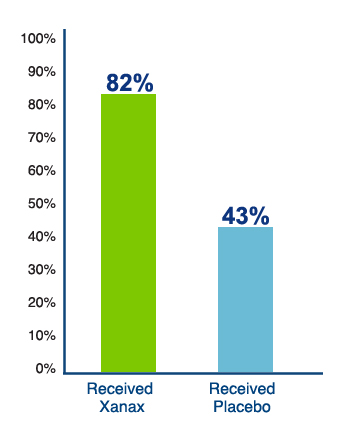
Jump to Section:
In the years 2005, 2009 and 2011, Xanax (alprazolam) was the most popular psychiatric medication prescribed in the United States, according to an analysis performed by IMS Health.
Millions of people take this drug each and every day, and sometimes they do so because they have very serious mental health concerns they’re trying to ameliorate with medications. But sometimes people take Xanax simply because they like the way the drug makes them feel. People like this, who likely have an addiction to Xanax, are playing a dangerous game that could cost them their health and their happiness.
Proper Use of Xanax
Xanax is a benzodiazepine medication that’s designed to alter the chemical content of the brain. For people who have panic-based mental health disorders, this alteration can be remarkably helpful. For example, in a study in the journal Archives of General Psychiatry, researchers found that 82 percent of people who received Xanax for a panic disorder were either moderately improved or markedly improved when the study was over, compared to only 43 percent of people who only got a placebo. Studies like this demonstrate just how much a Xanax prescription can do for people who have very serious mental health disorders, and results like this allow this drug to stay on the market, year after year. For some, it’s absolutely necessary.
People who take this drug for a medical disorder tend to follow directions carefully. They often choose to:
- Take the drug at the same time of day
- Refuse to mix the drug with another substance
- Keep track of side effects and discuss them with a doctor
- Look for ways in which to stop using the drug
Study on Xanax to Treat Panic Disorder
Results of Moderate to Significant Improvement

In other words, they’re using Xanax to help them move past a very difficult time that will soon pass. They might develop a physical dependence on Xanax, and they might feel ill when they don’t have access to the substance they’re accustomed to, but they may not be psychologically compelled to keep using.
Abusing Alprazolam

People who choose to take Xanax for recreational purposes often aren’t compelled to follow a doctor’s instructions about the use of this dangerous drug. They may not even work with a doctor at all. People like this steal the drug from other users, or they buy the drug from street dealers. Then these users combine their Xanax pills with other substances, including alcohol, heroin or methadone.
This mixing and matching produces a profound sense of sedation, and families often notice that an addiction is in play when the person begins to:
- Fall asleep during conversations
- Slur speech
- Stumble, stagger or trip
- Seem sleepy almost all of the time
As the addiction progresses, people who take Xanax may begin to experience symptoms of withdrawal between their doses of the drug. They may seem jittery, sweaty or nervous when there’s no supply of pills available, and they might even hallucinate or experience twitching muscles. If left untreated, this withdrawal syndrome can produce full-blown seizures, which can be life-threatening.
This mixing is dangerous, as this article will soon make clear, but those who abuse other drugs might also be at higher risk for developing addictions to Xanax, as their brains seem to be more responsive to the changes Xanax can bring about.
For example, a study in the Journal of Clinical Psychiatry found that alcoholics experienced more euphoria when they took Xanax, compared to people who were not alcoholics.
More research is needed to determine why other addictions prime the brain for a Xanax addiction, but it’s clear that some sort of link exists. For these people, Xanax might be too tempting to resist, and once they try it, they may quickly be addicted.
Xanax Addiction Recovery
People who abuse Xanax often need professional help in order to recover fully. Addictions like this can be difficult to combat alone, and the withdrawal process is full of very dangerous moments that require the help and attention that only a medical professional can provide. In addition, people who get sober need to learn how to maintain that sobriety, and often, that learning process is difficult for people to achieve without help. They may not know how to quell the cravings for drugs that speak to them in the deep of the night, and they may not understand how to keep their drug-using friends at bay, so they really can get sober. Therapy can be vital, as it provides people with the opportunity to both learn and practice.
This is the kind of help we can provide at Axis. Our luxury rehab facilities provide people with a safe and beautiful space in which to rest and heal, and our therapists are adept at designing therapy programs that can inform, motivate and soothe. When the person you love enters our facility, we design a custom program that addresses all of the triggers that keep a Xanax abuse syndrome alive, and we provide a number of alterative therapies that can help the person you love to heal on a spiritual level. We stay in touch when therapy is complete, to ensure that the person makes a smooth transition into the community, and we are always available for follow-up therapy, should that be required. We’re here to help, and we hope you’ll call us in order to find out more.



